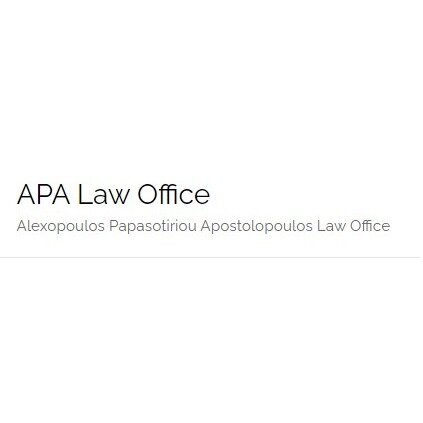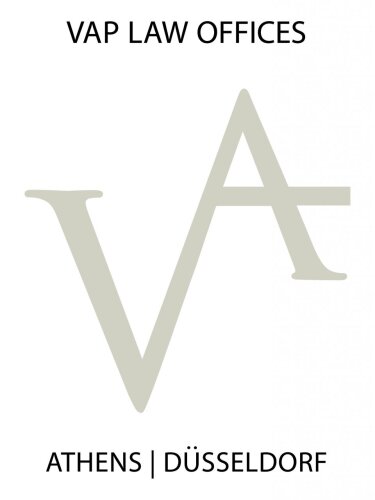Best Public-Private Partnerships (PPP) Lawyers in Greece
Share your needs with us, get contacted by law firms.
Free. Takes 2 min.
Or refine your search by selecting a city:
List of the best lawyers in Greece
About Public-Private Partnerships (PPP) Law in Greece
Public-Private Partnerships (PPPs) in Greece are collaborative projects where the public and private sectors join forces to deliver infrastructure or services that benefit the public. These collaborations allow public bodies to harness private expertise, efficiency, and funding to implement complex projects such as roads, schools, hospitals, and energy facilities. In Greece, PPPs have increasingly become a preferred method for developing and maintaining major infrastructure due to limited public funds and the need for modernization. The Greek government has established specific laws, procedures, and dedicated agencies to regulate, monitor, and facilitate PPP projects, ensuring transparency and balance between public interest and private investment.
Why You May Need a Lawyer
Entering into a Public-Private Partnership in Greece involves a complex legal, financial, and regulatory landscape. A lawyer with expertise in PPP law can be invaluable for the following reasons:
- Advising on the structure and legal framework of PPP contracts
- Preparing and reviewing partnership proposals and tender documentation
- Navigating public procurement rules and ensuring compliance
- Managing negotiations between public authorities and private investors
- Drafting and interpreting contractual agreements
- Resolving disputes, mediating, or representing clients in administrative or judicial proceedings
- Securing necessary permits, approvals, and clearances from relevant authorities
- Guiding on matters such as financing, risk allocation, and intellectual property
- Keeping clients updated about legislative developments affecting PPPs
Whether you are a private investor, a contractor, or a public authority, expert legal guidance helps minimize risks and maximizes the project's long-term success.
Local Laws Overview
Several laws regulate Public-Private Partnerships in Greece. The main legislative framework consists of Law 3389/2005 on PPPs, which sets out general principles, the process for project approval, and contractual requirements. Additional laws and regulations may apply depending on the sector or nature of the PPP, such as public procurement legislation, environmental law, tax provisions, and competition law.
Key aspects of Greek PPP law include:
- A special interministerial committee (the PPP Interministerial Committee) approves all PPP projects
- The process is regulated, transparent, and competitive to ensure value for money and integrity
- Risk allocation between public and private parties must be clearly defined in the contract
- Contracts typically cover long periods (often 15 to 30 years) and contain detailed provisions on financing, operation, and maintenance
- Dispute resolution mechanisms are provided within the contract, often including international arbitration
- Support and oversight are provided by the Special Secretariat for PPPs within the Ministry of Development and Investments
Compliance with EU law, including public procurement and competition directives, is also crucial for all PPP projects in Greece.
Frequently Asked Questions
What is a Public-Private Partnership (PPP)?
A PPP is a collaboration between public sector entities and private companies to finance, build, and operate projects or services that traditionally belong to the public sector.
Which Greek law governs PPPs?
Law 3389/2005 and its amendments provide the main legal framework for PPPs in Greece. Other relevant laws may include public procurement, tax, and environmental legislation.
What kinds of projects can be developed as PPPs in Greece?
Common examples include transportation infrastructure (roads, ports, airports), educational institutions, healthcare facilities, energy projects, waste management, and digital infrastructure.
Who approves a PPP project in Greece?
The PPP Interministerial Committee must approve all PPP projects before they begin, following a detailed evaluation process with specific criteria.
How are risks shared in a Greek PPP?
Risks are allocated between the public and private partners based on who is best able to manage each risk, and this allocation is explicitly detailed in the PPP contract.
Are PPP contracts in Greece subject to public procurement rules?
Yes, PPP contracts in Greece must comply with both Greek and EU public procurement rules to ensure fairness, transparency, and competitiveness.
What are the typical steps in establishing a PPP in Greece?
The main steps include project identification, approval by the PPP Interministerial Committee, public tendering, evaluation of bids, contract negotiation, contract signing, financial closing, and project implementation.
Can disputes in PPP projects be resolved by arbitration?
Yes, most Greek PPP contracts include arbitration clauses, allowing disputes to be resolved by national or international arbitration panels.
What is the duration of a typical PPP contract in Greece?
PPP contracts in Greece usually last between 15 and 30 years, depending on the project’s nature and required investment recovery period.
Can foreign investors participate in Greek PPP projects?
Yes, foreign investors are encouraged to participate in PPP projects in Greece, provided they meet the tender requirements and comply with Greek and EU legislation.
Additional Resources
If you need more information about Public-Private Partnerships in Greece or require specific documentation, consider consulting the following resources:
- Special Secretariat for PPPs within the Ministry of Development and Investments
- PPP Interministerial Committee
- Greek Ministry of Infrastructure and Transport
- Greek Ministry of Environment and Energy (for sector-specific projects)
- European PPP Expertise Centre (EPEC)
- Official Gazette of the Hellenic Republic (for legislative updates)
- The Athens Bar Association or local bar associations (for legal referral services)
Next Steps
If you consider entering into a PPP or are involved in ongoing projects in Greece, the following steps can help protect your interests and ensure legal compliance:
- Collect all relevant documentation and information about your project or involvement in a PPP
- Consult with a lawyer or legal advisor who specializes in PPPs and understands the Greek legal landscape
- Schedule a meeting to discuss your objectives, concerns, and questions about the PPP process
- Act promptly to meet any deadlines for applications, tenders, or compliance requirements
- Stay informed about new regulations or guidelines issued by Greek authorities or the European Union
Professional legal guidance is crucial when navigating the intricate framework of PPPs in Greece. Seeking expert advice early in your project can help anticipate challenges, structure beneficial agreements, and achieve successful outcomes.
Lawzana helps you find the best lawyers and law firms in Greece through a curated and pre-screened list of qualified legal professionals. Our platform offers rankings and detailed profiles of attorneys and law firms, allowing you to compare based on practice areas, including Public-Private Partnerships (PPP), experience, and client feedback.
Each profile includes a description of the firm's areas of practice, client reviews, team members and partners, year of establishment, spoken languages, office locations, contact information, social media presence, and any published articles or resources. Most firms on our platform speak English and are experienced in both local and international legal matters.
Get a quote from top-rated law firms in Greece — quickly, securely, and without unnecessary hassle.
Disclaimer:
The information provided on this page is for general informational purposes only and does not constitute legal advice. While we strive to ensure the accuracy and relevance of the content, legal information may change over time, and interpretations of the law can vary. You should always consult with a qualified legal professional for advice specific to your situation.
We disclaim all liability for actions taken or not taken based on the content of this page. If you believe any information is incorrect or outdated, please contact us, and we will review and update it where appropriate.
Browse public-private partnerships (ppp) law firms by city in Greece
Refine your search by selecting a city.

















